The term “content engineer” is a fairly new one in marketing circles, popping up more often as AI reshapes how content is created and managed. But is it a real job or just another buzzword? The truth lies somewhere in between.
Titles aside, what really matters are the skills that content marketers need today—understanding systems, automation, and creative oversight. AI has made content production much faster, cheaper, and lowered the barrier to entry in the marketing space.
So do we need a new role to keep up with AI processes? I will answer this question and walk you through everything you need to know about content engineering.
What you will learn
- What content engineering is and how it compares to traditional content marketing
- What a content engineer does
- How you can become a content engineer and the skills you need
What is content engineering?
Content engineering is the practice of applying technical workflows to speed up optimization and creation of content at scale, from ideation and research to distribution and promotion.
This role emerged to solve the growing operational and strategic challenges created by AI’s impact on search and content. Tools like ChatGPT and Claude have accelerated content creation, making it easy for anyone to produce content quickly, but also leading to saturation and declining quality.
I do want to point out that content engineering isn’t a brand-new role, and should be considered the next step in the evolution of content marketing. The term "content engineer" is also reminiscent of a term widely used in marketing – "growth hacking".
Neither requires coding, but a content engineer needs to think like a systems designer: building repeatable frameworks that improve quality, reduce costs, and speed up output.
So to summarize, a content engineer is really a content marketer who can use AI to make their work easier, and identify potential opportunities that may have been otherwise restricted by time and human limitations.
I will still aim to answer the many questions surrounding this role because I can see that there are job postings for content engineer roles.
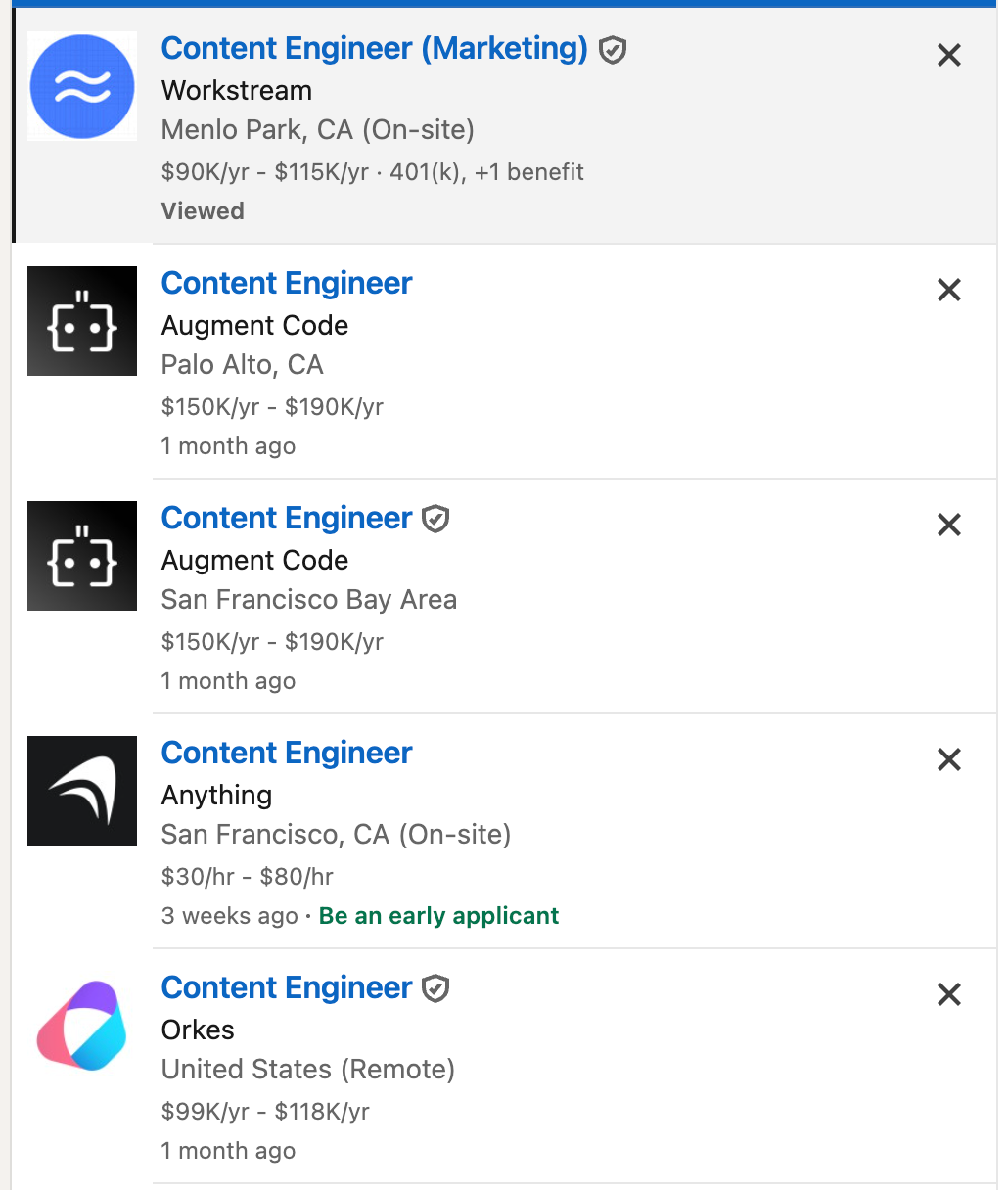
Ahrefs' Ryan Law has a skeptical stance on the content engineer role suggesting the role may be overhyped and risks prioritizing automation over creativity. I agree with his assertion that true marketing success still depends on strong strategy, research, and writing rather than systems alone.
"I realise that the Content Engineer is almost diametrically opposed to the skills and abilities I believe we need. i am impossibly bullish on AI, but i think the Content Engineer is the wrong skill set for the future of marketing."
– Ryan Law, Ahrefs
AirOps, on the other hand, sees the content engineer as a “10x marketer” — a systems thinker who blends AI, automation, and analytics to scale quality output efficiently. Similarly, Jasper thinks of a content engineer as the next evolution of the content strategist: someone who bridges technology and storytelling to create personalized, AI-driven content at scale.
The content engineering role integrates AI, data, and automation into the content process itself. It replaces manual, repetitive tasks such as keyword and SERP analysis, brief writing or repurposing with scalable, automated workflows.
For example, The New York Times uses a set of internal AI tools to help reporters brainstorm headlines, summaries, and social copy, and even suggest quiz or FAQ ideas.

But there’s a clear line so AI can’t write or change full articles or publish anything without a human in charge. It’s a great example of how content automation can support, not replace editorial insights.
Content engineering vs content marketing
As I pointed out, content engineering should not be treated as a separate discipline from content marketing, but as an extension of it. Content engineering is a form of traditional content marketing that emphasizes repeatable systems to develop content at scale through AI, automation, and analytics tools.
Like content marketing, content engineering still focuses on strategy, storytelling, and distribution to increase traffic, engagement, and conversions. But it also adds automated processes to scale these objectives.
Dont mistake content engineering to just involve publishing AI-generated content in mass. Instead, it uses data, AI, and automation to speed up and standardize the process of optimizing human-AI content.
A content engineer still needs to retain authenticity and creativity.
What does a content engineer do?
A content engineer creates and maintains integrated systems that connect every stage of the content lifecycle from ideation and creation to optimization, distribution, and performance tracking.
Here are a few examples of tasks that a content engineer may perform.
Conducting research and content briefs using AI:
A content engineer sets up systems that automatically gather keyword, SERP, and competitor data to generate detailed briefs. For example, the team at Surfer often uses NotebookLM to simplify long white papers, or summarize technical information as part of their research process.
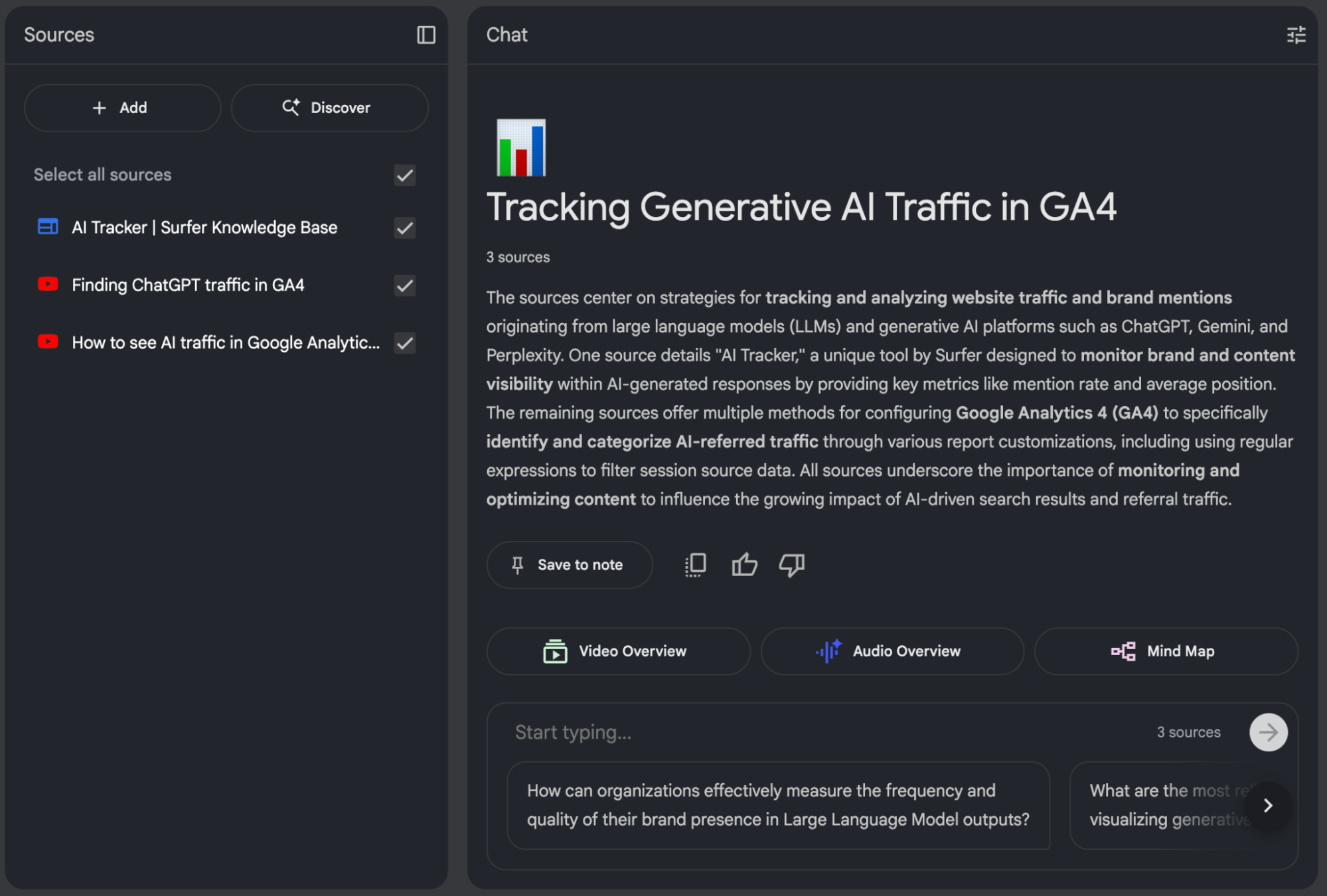
It beats reading a 150 page document about Google’s algorithms.
Creating structured content templates for faster production
The engineer builds templates for certain kinds of blog posts or case studies that automatically add introductions, conclusions and internal link suggestions. This ensures every piece follows brand standards while reducing production time.
To reiterate that AI content doesn’t require a new role, remember that The Washington Post was using an internally developed tool, “Heliograf” in 2016 to automatically generate short news reports and updates, freeing journalists for deeper stories.
Managing content operations using tools like Airtable, Notion, or Zapier
A content engineer may maintain a content calendar connected through Zapier automations. When a brief is approved, tasks are assigned, deadlines updated, and notifications sent automatically to relevant team members.
Testing and iterating using Google Search Console and analytics dashboards
Once content is live, engineers track impressions, CTR, and rankings to refine workflows. For instance, if a certain page isn't performing well, certain sections can be updated with new content to see if the page improves performance.
For example, a content engineer may use an API to batch-update meta descriptions for all their pages.
It's safe to say that these processes would've taken hours if done manually.
Which tools does a content engineer use?
Let me walk you through some tools useful for content engineering. I'll split them into various categories to cover platforms for different steps of the content development process.
1. AI writing and ideation tools
AI chatbots like ChatGPT and Perplexity can help find relevant content ideas around particular topics and summarize documents like reports or whitepapers for quicker research. They are also useful for developing structured content briefs and first drafts.
Here’s a prompt you may can use to help create briefs in ChatGPT or other LLM tools.
I want you to help me write an original blog post outline titled "[descriptive name of your blog post]" complete with H2s and H3s and bullet points. Please retain sentence case and capitalize only the first letter. Here are your headings. [please add your headings]
H2 What is X
H2 Why is X important
H2 X Ways to do Y
H3 Tactic 1
H3 Tactic 2
H3 Tactic 3
Add 3-5 talking points under each header. Be detailed and instructional in your talking points. Assume you are instructing a novice writer who will need specific direction and has to be told exactly what to write about.
Provide links to research or read where you think the writer will benefit.
As you're writing an outline, your points under each header must be instructions, not explanations. For example, ask the writer to explain, discuss, or expand on the points under each header by providing clear instructions in full sentences or paragraphs.
2. SEO and analytics tools
SEO and analytics tools help with data-backed decision-making. They let content strategists and engineers find relevant keywords, pinpoint the search intent around these keywords and analyze their (or their competitors') content performance.
Here are some popular tools that content engineers may use.
Surfer: A dedicated SEO platform that can automate content engineering-related tasks: keyword research, topic cluster development, search engine-optimized briefs and content generation.
Surfer’s tools cover most tasks that a content engineer may be required to undertake, making their job much easier.
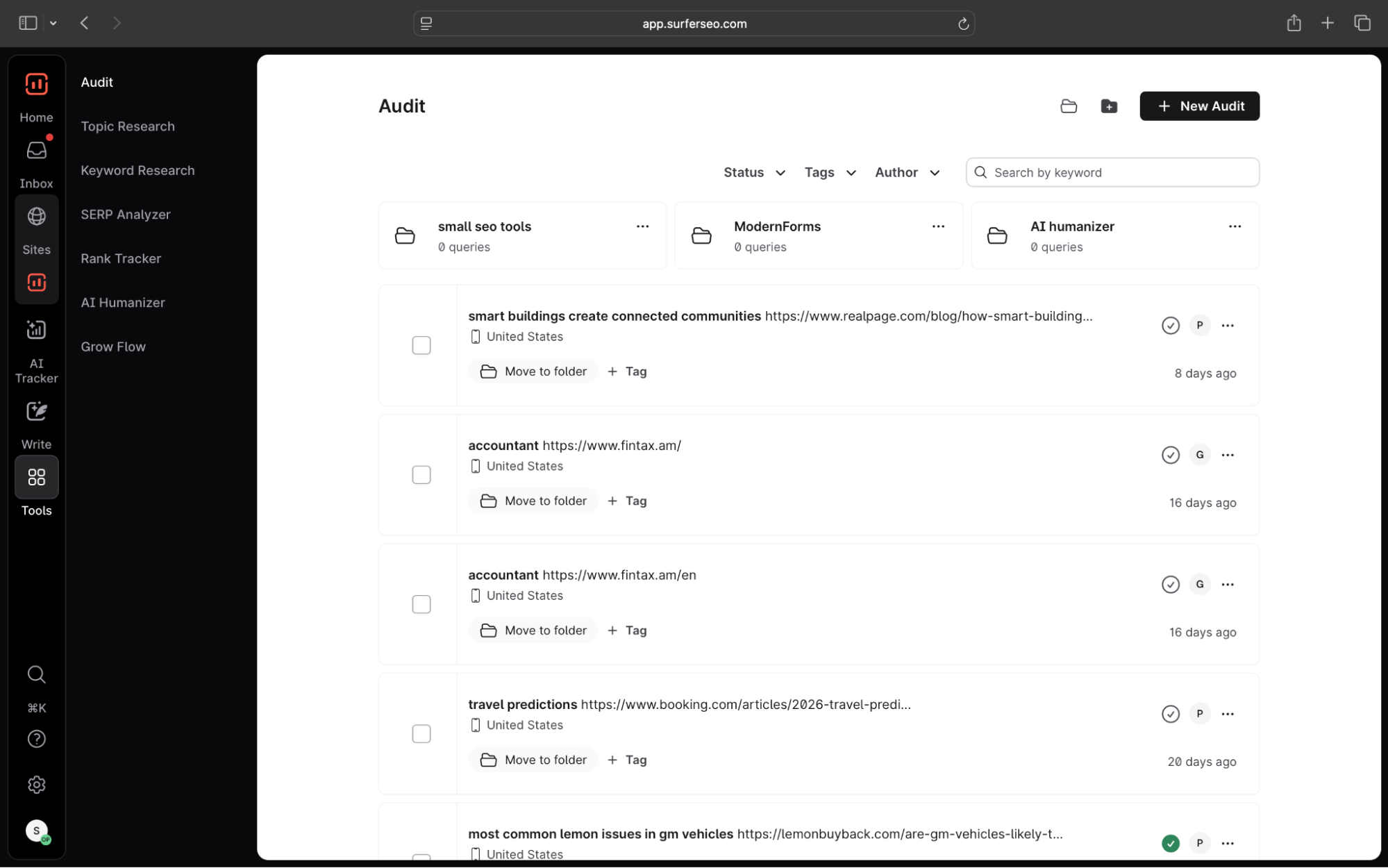
Ahrefs: An SEO suite with powerful keyword research, competitive analytics, backlink and site auditing tools.
Google Search Console: A free tool useful for monitoring your site's SEO performance: it helps uncover what keywords drive the most traffic to your website, spot any crawlability-related issues, and more.
Screaming Frog: A content engineer hire can set Screaming Frog to run weekly crawls, exporting structured data into Google Sheets or Airtable for automated audits to monitor technical health and speeds up fixes.
3. Automation and workflow tools
These play a central role in content engineering, as they help build systems that automate routine tasks.
Here are a few popular examples:
- Zapier, N8N, and Make: These help connect and automate workflows between multiple apps.
- Airtable: A spreadsheet-based database builder handy for project management automation and linking multiple databases together. Content-specific use cases can include building large-scale keyword and metadata framework databases for programmatic SEO strategies.
- Notion: You can set up wiki pages containing brand voice guidelines, content briefs, and reusable digital assets for each particular project.
For example, Reuters uses an AI-powered tool called Lynx Insight to assist its journalists in identifying story ideas and analyzing massive data sets in real time. The system automatically surfaces trends, anomalies, and insights that reporters can turn into stories—essentially functioning as a data and research co-pilot.
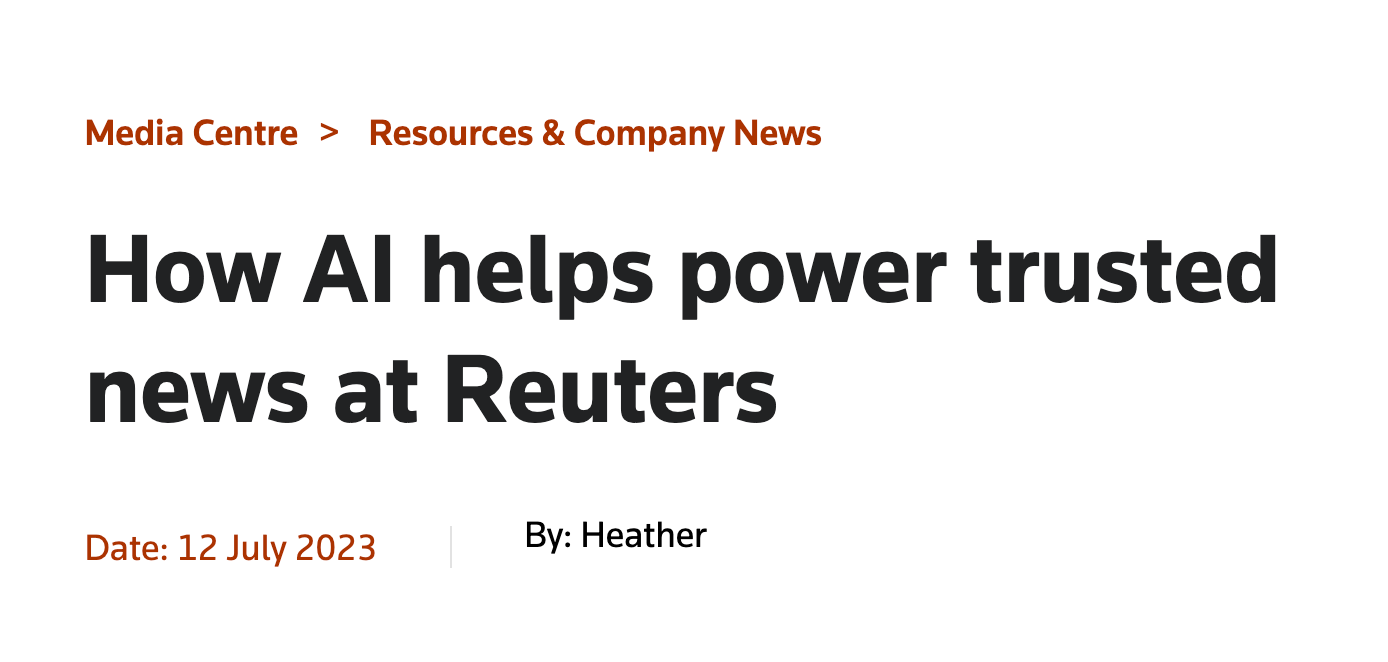
The AI-led automation handles the heavy data lifting, while human editors apply judgment, context, and narrative to produce trustworthy reporting.
How to become a content engineer?
To become a content engineer, you will need a foundation in content marketing with practical experience using AI, automation, and analytics platforms to build scalable content workflows.
It’s a role that demands both creative and technical fluency—someone who understands storytelling and SEO, but can also design efficient, data-driven workflows that enhance content performance end-to-end.
Here are 3 potential learning paths to take.
Online certifications
Completing online certifications can provide structured learning in content marketing, SEO, and analytics while introducing foundational AI and automation tools. For instance, Surfer’s Content Optimization Masterclass, HubSpot Academy’s courses on content strategy and Coursera’s data analytics programs offer recognized credentials to validate your expertise in building content workflows.
Self-study through SEO blogs and AI tutorials
Following SEO-focused blogs like Surfer, Ahrefs, and Search Engine Journal, combined with hands-on practice through AI tutorials and automation guides can help you gain real-world, practical insights.
Try to implement your learnings directly on your blog to see how you can achieve better traffic.
Real-world experience through freelance or startup projects
Nothing replaces hands-on execution.
Once you feel comfortable with your newly acquired skills, you can start pursuing freelance content marketing and engineering roles. And of course, use platforms like LinkedIn to market yourself and expand.
Either way, having experience with content should be your baseline. Make sure to get familiar with SEO and AI tools along the way to nail down the basics and understand how they work.
Content engineering skills
Now that you have a general idea of how to become a content engineer, here are a few content engineering skills that can help.
Understanding of SEO fundamentals and analytics
A strong grasp of SEO fundamentals is essential—understanding how search engines index, rank, and evaluate content ensures every system and workflow you design supports measurable visibility and growth.
Still, SEO is a huge field within itself, so here are a few content-specific SEO practices you should first focus on:
- Optimizing for AI SEO visibility and brand mentions.
- Deep understanding of Google’s E‑E‑A‑T principles to ensure AI‑generated and human‑edited content aligns with trust, expertise, and user‑first standards.
- Keyword research workflows that feed AI models the right semantic signals and ensure briefs and outlines match search demand.
- Developing topic clusters that help both algorithms and AI tools understand context and authority around a subject area.
- Running competitive content analysis pipelines that train AI prompts and automation rules based on what’s performing best across your niche.
Familiarity with AI and automation tools
AI and automation tools are the backbone of content engineering. Continuously experiment with them to understand how they work, how to use various platforms under connected workflows, and how to generate content with minimal errors or human intervention.
Keep testing different AI use scenarios— build integrations between SEO tools and LLMs, and observe what drives the best outcomes.
For example, Zapier uses automation to create thousands of landing pages, each populated with integration-specific content pulled from a database.
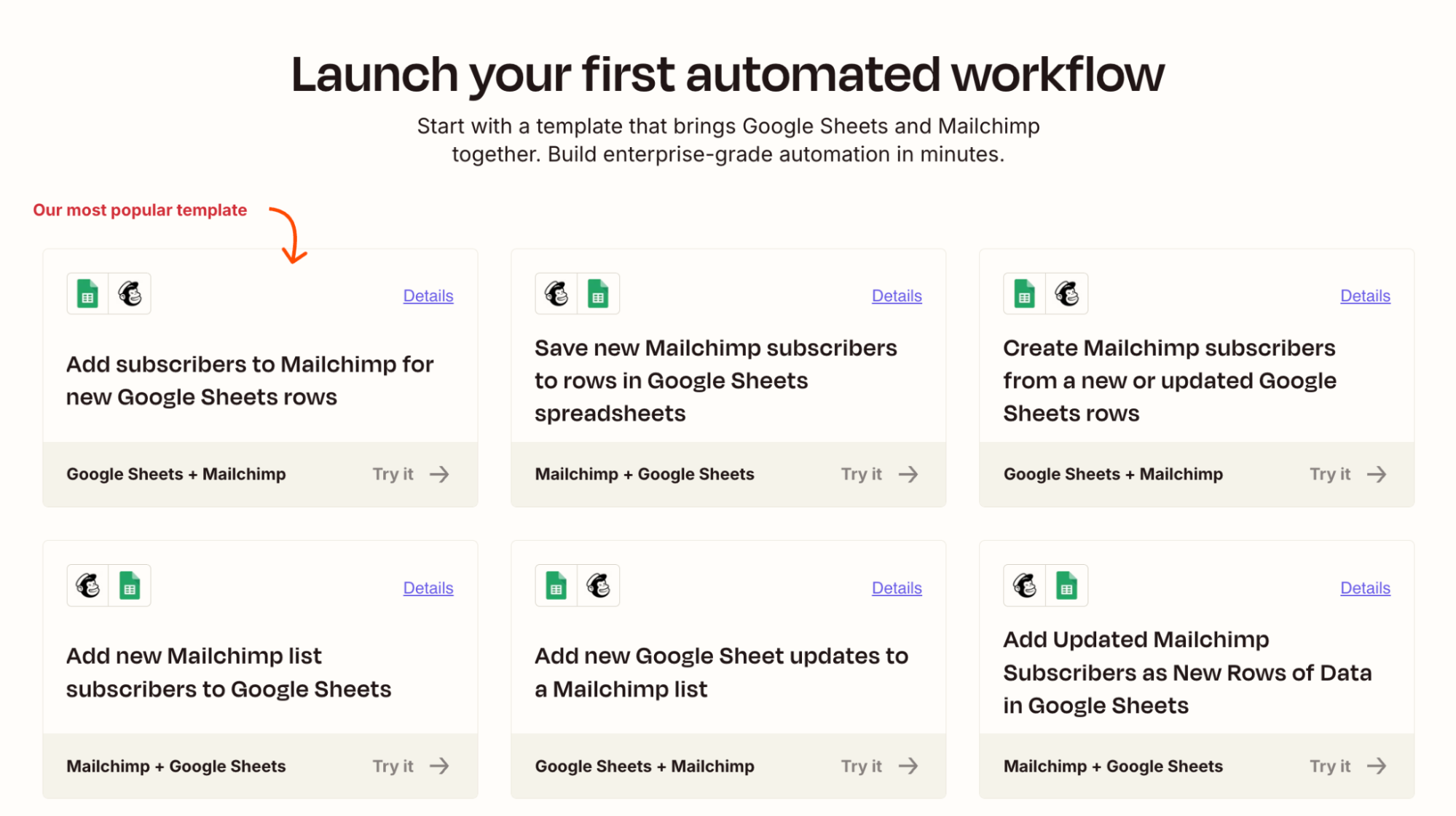
Stay updated with every new AI release and keep tinkering with tool capabilities. Over time, you might even 'vibe code' simple scripts or automations yourself to build bespoke workflows that perfectly fit your content systems.
Comfort with data, spreadsheets, dashboards and A/B testing
Content engineering feeds on data, so you must be accustomed to working with spreadsheets, customer data platforms, analytics tools, and so on.
It’s natural that Excel skills are useful for a content engineer.

These allow you to perform various tasks, like setting up programmatic SEO strategies, as well as data-backed content strategies that can extract information like meta data at scale.
A/B testing variables (content structure, subject lines, CTAs, navigation, thumbnails, etc.) to find what's working and integrate it into your process is also a useful skill for the content engineering role.
Designing repeatable workflows with systems thinking
Systems thinking gives you a better understanding of how multiple elements can form a complex entity to fix problems and establish smooth workflows.
As an example, systems thinking in content can involve repurposing long-form content into email newsletters, then using prospect data from CRM tools to allow for explicit content personalization.
Strong editorial control
Strong editorial control is one of the most critical skills for a content engineer. You'll need to ensure that while AI and automation handle scale and efficiency, your final output still meets brand voice, quality, and storytelling standards.
This involves establishing clear writing and style guidelines, maintaining consistency across human and AI-generated content, and implementing feedback to protect editorial integrity.
We’ve seen Zapier’s programmatic pages, but notice that they also create “how-to” blog articles integrating tools for their users.
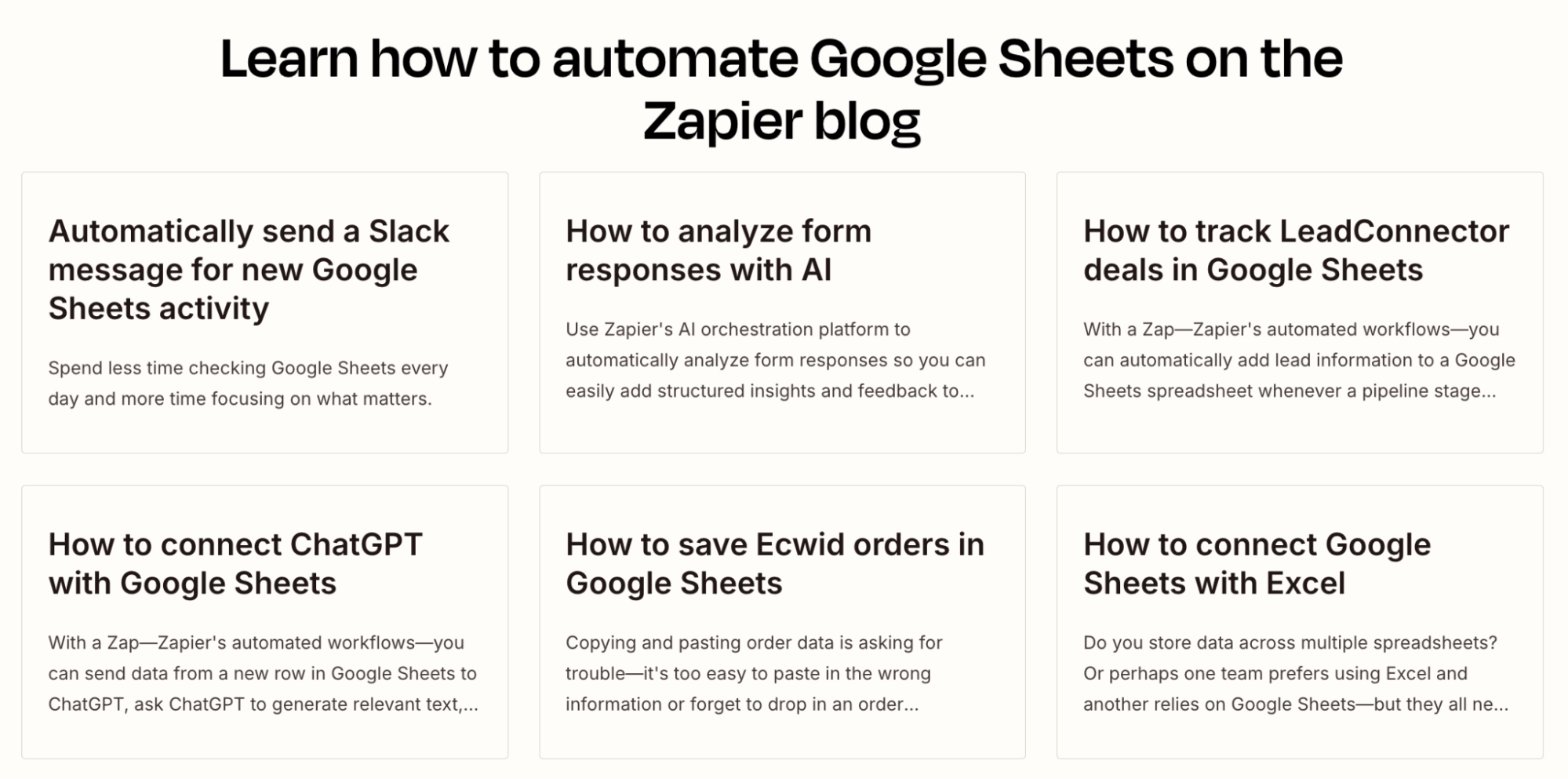
Is content engineering a good career?
Yes, content engineering can be a good career path. According to Glassdoor, the content engineering salary in the US sits at $93k to $155k.
Content engineering positions are likely to be in demand since there's a noticeable increase in AI-related job postings across the board, while workers with AI skills typically receive wages 56% higher than those who don't.
Companies may prefer marketers who know how to use AI and automation to scale content ops, over traditional content marketers.
Still, it's worth noting that content engineering is in its infancy. The role is currently rather loosely defined, and a content engineer's exact roles and responsibilities are not 100% clear yet.
Do you need a degree to become a content engineer?
No, a university degree is not required to become a content engineer. Content engineering is a cross-disciplinary field that involves marketing, writing, and tech. Although a degree can help, practical experience in a marketing role is more important.
Good content engineers are also adaptive learners, with a knack for curiosity, experimentation, and execution when taking elements from across multiple disciplines and turning them into functional, results-oriented workflows.
For example, someone without a degree who may have vibe coded their own AI workflows will be a better fit for a content marketer's role than someone who holds a degree but has no practical skills gained through experience.
Key takeaways
- Content engineering bridges the gap between creative content production and AI implementation to unify and scale content development—it's the AI-centric evolution of content marketing.
- Content engineering practices aim to eliminate siloed content supply chains through AI systems that automate research, outline or draft creation, bulk optimization, repurposing, and more.
- That involves setting up an enterprise content ecosystem made out of AI writing assistants, SEO platforms, project management workflow automation tools, and content management systems, for example.
- Content engineering still is a loosely-defined role, but it requires deep familiarity with AI-powered content systems, SEO, systems thinking, analytics dashboards and databases, as well as editorial best practices.
- Although still in its infancy, content engineering seems like a promising career path, given the uptick in AI-first job positions and wages.
- Content engineering doesn't require a degree, but having cross-disciplinary experience across SEO, content marketing, and AI tech is highly recommended.





